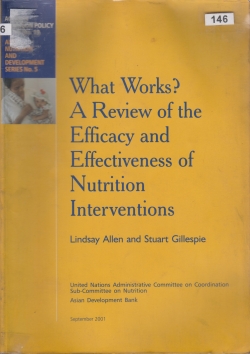The Effects of Improved Nutrition in Early Childhood: The Institute of Nutrition of Central America and Panama (INCAP) Follow-up Study

Type
Publication
Authors
Category
References
[ Browse Items ]
Publication Year
1995
Publisher
United State Agency for International Development (USAID), United States
Pages
1027S-1138S
Subject
Children--Central America--Nutrition
Abstract
This is an overview of the design and methods of the INCAP longitudinal study (1969-77) and its follow-up study (1988-89). The first study had the objective of assessing the effects of intrauterine and preschool malnutrition on growth and mental development. To achieve this, food supplement were provided to pregnant women and young children residing in four Guatemala villages. Two villages were given a high-protein, high-energy drink and two were provided a no protein, low energy drink. Both supplements contained vitamins and minerals. Longitudinal information was collected during the first seven years of life on physical growth, mental development, attendance and consumption of supplement, home diet, morbidity and on characteristics of the family. Health and nutrition data on mothers also were collected. The INCAP follow-up study was a cross-sectional evaluation of former participants of the first study and was carried out when the subjects were 11-27 y old. The hypothesis of the INCAP follow-up study was that improved nutrition in early childhood leads to enhanced human capital formation in adolescents and adults. Data were collected on physical growth and body composition, maturation, work capacity, intellectual performance and school achievement.
Number of Copies
1
| Library | Accession No | Call No | Copy No | Edition | Location | Availability |
|---|---|---|---|---|---|---|
| Main | 1584 |
RJ 206 E43 1995 |
1 | Yes |




